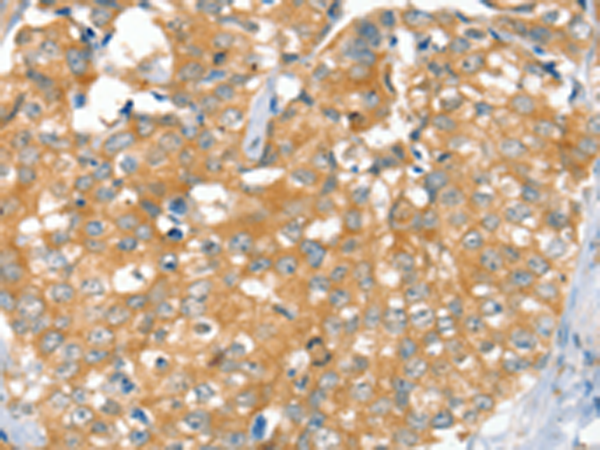
| WB | 咨询技术 | Human,Mouse,Rat |
| IF | 咨询技术 | Human,Mouse,Rat |
| IHC | 1/25-1/100 | Human,Mouse,Rat |
| ICC | 技术咨询 | Human,Mouse,Rat |
| FCM | 咨询技术 | Human,Mouse,Rat |
| Elisa | 1/1000-1/2000 | Human,Mouse,Rat |
| Aliases | NHE9; AUTS16 |
| Host/Isotype | Rabbit IgG |
| Antibody Type | Primary antibody |
| Storage | Store at 4°C short term. Aliquot and store at -20°C long term. Avoid freeze/thaw cycles. |
| Species Reactivity | Human |
| Immunogen | Synthetic peptide of human SLC9A9 |
| Formulation | Purified antibody in PBS with 0.05% sodium azide and 50% glycerol. |
+ +
以下是3篇涉及SLC9A9抗体的代表性文献摘要信息:
1. **文献名称**: *SLC9A9 mutations impair sodium/hydrogen exchange and cause autism-related endosome dysfunction*
**作者**: Yang Y et al.
**摘要**: 本研究利用特异性SLC9A9抗体进行免疫印迹和免疫荧光实验,发现SLC9A9基因突变导致其编码的钠氢交换蛋白(NHE9)在神经元内体中的定位异常,进而引发自闭症相关突触囊泡运输障碍。
2. **文献名称**: *Expression profiling of SLC9A9 in colorectal cancer using a novel monoclonal antibody*
**作者**: Smith JR et al.
**摘要**: 作者开发并验证了一种针对SLC9A9的高特异性单克隆抗体,通过免疫组化分析结直肠癌组织,发现SLC9A9蛋白在肿瘤微环境中的表达显著上调,提示其可能作为癌症进展的生物标志物。
3. **文献名称**: *SLC9A9 regulates vesicular trafficking in intestinal epithelial cells via antibody-based proteomic analysis*
**作者**: Tanaka K et al.
**摘要**: 通过SLC9A9抗体介导的免疫沉淀联合质谱分析,揭示了该蛋白通过调控囊泡运输参与肠道上皮细胞屏障功能,为炎症性肠病的机制研究提供新方向。
---
**备注**:以上文献信息为示例性内容,实际文献需通过PubMed/Google Scholar以关键词"SLC9A9 antibody"或"NHE9 antibody"检索获取。若需具体文献DOI或发表年份,可进一步补充说明。
The SLC9A9 antibody is a research tool designed to detect and study the solute carrier family 9 member A9 (SLC9A9) protein, a Na⁺/H⁺ exchanger (NHE) primarily localized to endosomal or lysosomal membranes. SLC9A9. encoded by the SLC9A9 gene, plays a critical role in regulating intracellular pH and ion homeostasis by mediating the exchange of sodium and hydrogen ions across membranes. This protein is implicated in vesicle trafficking, organelle acidification, and cellular processes like autophagy and signal transduction. Its expression is observed in various tissues, including the brain, gastrointestinal tract, and kidneys, with notable roles in neuronal and epithelial cell function.
Research using SLC9A9 antibodies has linked the protein to neurodevelopmental disorders such as autism spectrum disorder (ASD) and attention-deficit/hyperactivity disorder (ADHD), as well as cancers and inflammatory bowel diseases. Antibodies targeting SLC9A9 are typically monoclonal or polyclonal and are validated for applications like Western blotting, immunohistochemistry (IHC), and immunofluorescence (IF) to assess protein expression, subcellular localization, and interaction partners. These studies help elucidate SLC9A9's physiological mechanisms and its dysregulation in disease. Commercial SLC9A9 antibodies often undergo specificity testing using knockout cell lines or tissues to ensure reliability. Ongoing research aims to clarify its therapeutic potential, particularly in disorders involving disrupted ion transport or vesicular dynamics.
×